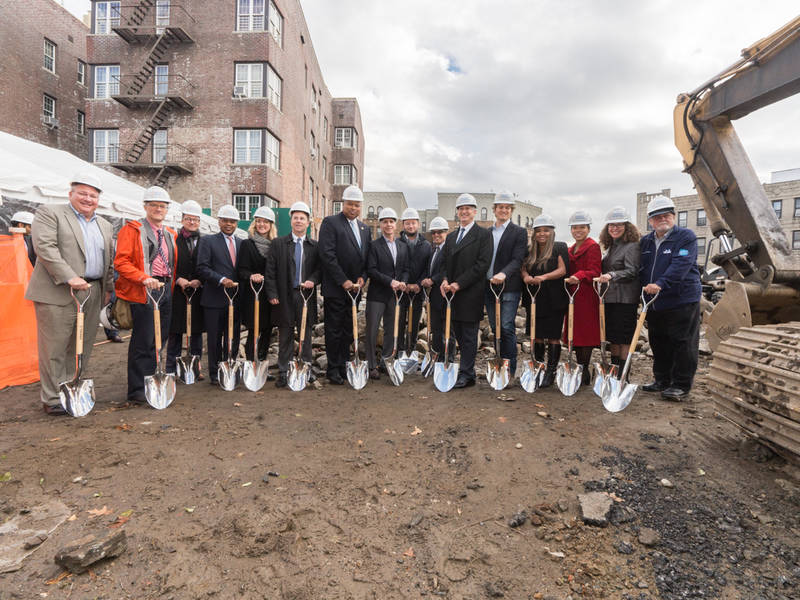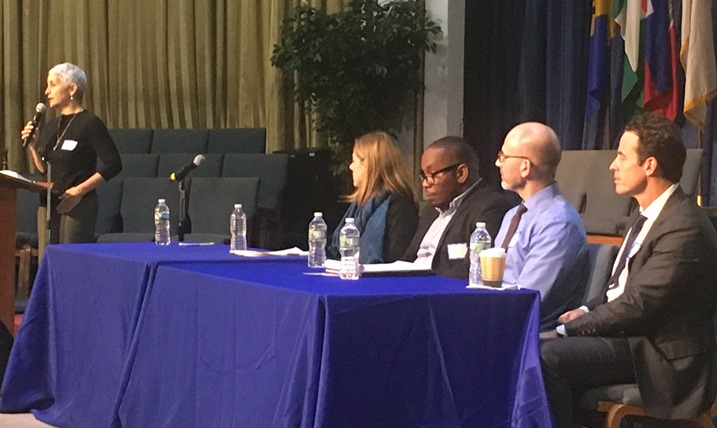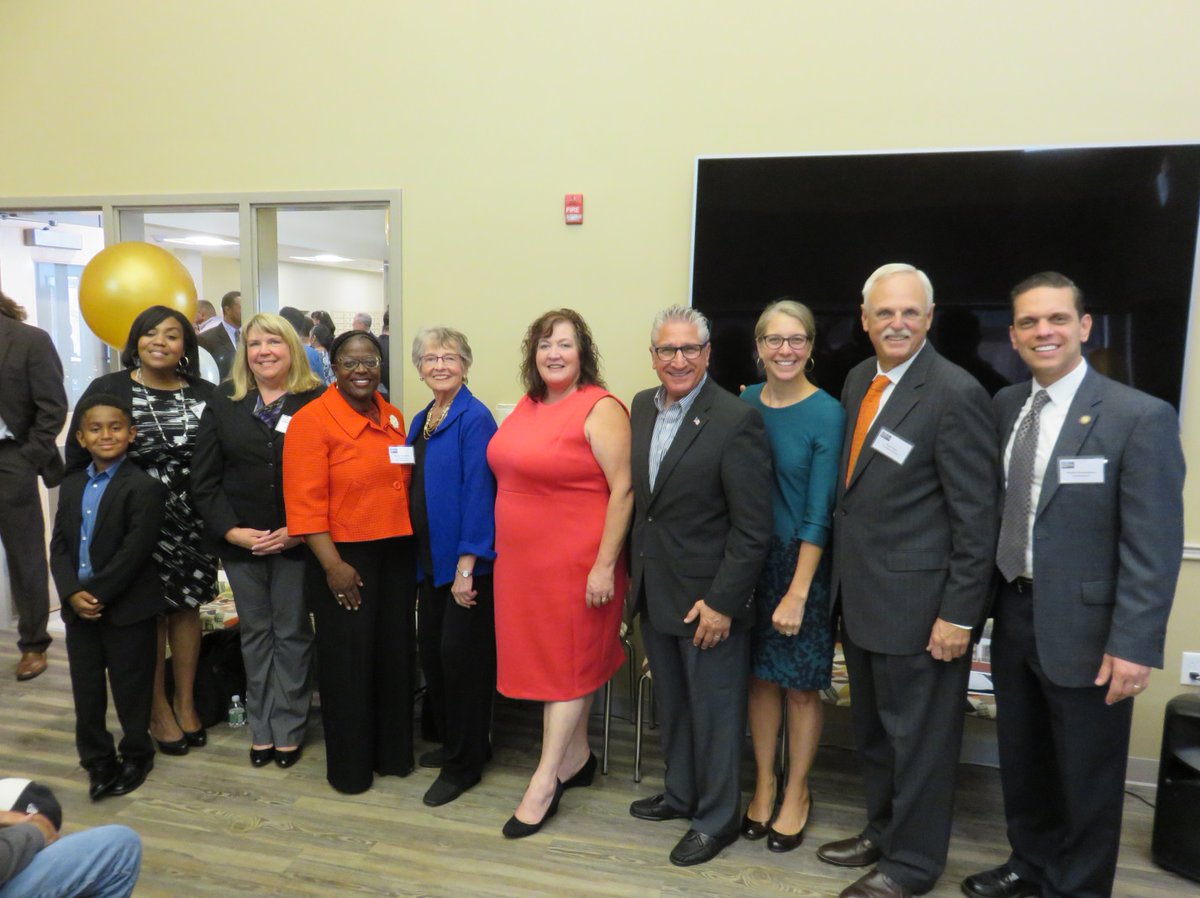

Showing Posts by Date: 11/2017
11.28.2017

Breaking ground for Bedford Green.
Fifty city, state, federal, and private sector partners gathered on the construction site of Bedford Green House, an extraordinary new affordable/supportive housing development for the Bedford Park section of the Bronx that will feature, a living green façade, an interior green wall, and a rooftop aquaponic system to raise fish and produce in addition to a teaching kitchen, a community playground and a landscaped garden. The 13-story Bedford Green House will be built in two phases, with 118 units going up now and 90 units later. But that’s not all that’s new and exciting about the project, as Project Renewal CEO Mitchell Netburn pointed out in his welcoming speech: “Bedford Green House continues the organization’s 50-year history of “firsts” including the first outreach to homeless alcoholics, the first non-hospital detox, and the first shelter for LGBTQI young adults. Bedford Green House will be Project Renewal’s first project to serve families.”
On hand to celebrate was Lynne Patton, HUD Regional Administrator for New York and New Jersey who quoted project consultant Jonathan Rose: “today we stick shovels in the ground to build gardens in the sky.”
HPD commissioner Maria Torres-Springer pointed out that the project embodies the Mayor’s newly released Housing 2.0 Plan, both by creating much needed affordable and supportive housing and through its dependence on a mission-based nonprofit as its developer/owner.
Assembly Member Jose Rivera strongly supported the project and the mission behind it, telling attendees that he too had been homeless when his family first came here, “and, if it wasn’t for people like you…”
Also deeply moved was Chris Johnson, the CEO of Hollister, the contractor for Bedford Green House, who told participants that the project was an embodiment of the precepts his mother instilled in him: “You have to give to live.”
Fred Harris of Jonathan Rose quipped, “If it takes a village to develop affordable housing, it takes a medium sized city to develop supportive housing.”
Luminaries included Office of Temporary and Disability Assistance (OTDA) Commissioner Sam Roberts, NYC Housing Development Corporation (HDC) President Eric Enderlin, Bank of America’s Todd Gomez, Bronx CB 7 Chair Adeline Santiago, Deutsche Bank’s John Kimble, and CSH’s Jen Trepinski.
On site services will include primary medical care, mental health treatment and support, substance use disorder counseling and treatment, conflict resolution, domestic violence counseling and support, family reunification services, horticultural therapy, nutritional counseling, healthy cooking workshops, occupational therapy, STD / HIV prevention, treatment, and support, and respite / alternative caregiving. On site services will be funded by the NYC Department of Health and Mental Hygiene and the Human Resources Administration.
Bedford Green House was financed under HDC’s Extremely Low- and Low-Income Affordability (ELLA) program and HPD’s Supportive Housing New Construction program. The total development cost for the project is over $58.8 million. HDC provided volume cap bonds, recycled tax-exempt bonds, and nearly $7 million in corporate reserves. HPD provided $8.85 million in City subsidy, inclusive of $2 million in HUD HOME funds and Low-Income Housing Tax Credits (LIHTC), Bank of America served as tax credit investor and provided the construction letter of credit. NYS OTDA provided funding under the Homeless Housing and Assistance Program (HHAP). Additional grant funding was provided by TD Bank and Deutsche Bank Foundation. CSH provided predevelopment loans.
Bedford Green House’s development team is led by Mitchell Netburn and Sam Wells at Project Renewal, and consulting services were provided by Jonathan Rose and Dale White at The Jonathan Rose Companies. Hollister Construction Services is serving as the general contractor. Architectural design services are provided by Andrew Knox of Edelman Sultan Knox Wood Architects.
11.27.2017
(1).jpg)
Renaissance Village, affordable/supportive housing for homeless veterans on Long Island was developed with Private Activity Bonds that have been eliminated in House’s version of tax reform.
While both the Senate and House versions of tax reform would result in huge deficits that will impact all non-defense spending including homeless housing programs, the House bill (HR 1) that passed on November 16, would have a devastating impact on affordable and supportive housing by eliminating tax exempt private activity bonds (PAB). These bonds provide capital funding in conjunction with the 4% LIHTC. These credits are available as-of-right, and automatically qualify for PABs. They are responsible for about half of the affordable housing development across New York State.
While HR 1 preserves the 9% Low Income Housing Tax Credit (LIHTC), drastic proposed cuts to the corporate tax rate will erode the LIHTC’s value by an estimated 25%.
It is estimated that the state will lose $4.5 billion dollars and 17,000 units of affordable housing annually with these changes. Also eliminated are Historic Tax Credits and New Market Tax Credits, two valuable tools used to spur housing and community development.
The Network, along with a broad swath of affordable housing groups and housing agencies, immediately began advocating against HR1: We alerted our membership to share their opinions about the bill with their representatives; we put out a joint press release; and we published editorials defending the restoration of private activity bonds to the bill. We also led a series of key meetings in Washington, D.C. with several of the Republican representatives whose votes were in play.
In the end, all amendments to the bill were defeated along straight party lines. HR1 passed with 227 votes for, and 205 votes against, with only 13 Republicans voting against it. This group of Republican dissenters includes five New York State representatives: Donovan, Faso, King, Stefanik, and Zeldin, whose opposition was based primarily on the elimination of deductibility for state and local taxes. The PAB cuts are a concern that several of these representatives raised during a press conference explaining their votes. All Democrats voted against the bill.
The Senate Finance Committee introduced its own tax reform bill, after rejecting the House bill unanimously. This bill preserves the PAB, and the 9% LIHTC although, again, the drastic cut to corporate tax rates will lead to the same 25% devaluation of tax credits. It will only require a majority to pass in the Senate, which is closely divided. Both New York Senators are opposed, as are the rest of the Democrats. This bill passed out of the Finance Committee and will face fierce debate on the senate floor. A vote is expected after Thanksgiving recess. If this competing bill passes, the House and Senate will form a reconciliation committee to produce a final version of the bill.
Attempts are also being made to improve both versions of the bill, by addressing the loss of value to the 9% LIHTC, and by adding provisions of the Cantwell-Hatch bill that would improve the efficiency of the program. Some of these provisions may make it into the final Senate bill. Unless the Senate bill fixes the loss in valuation of the credit, there will be a significant loss of capacity to develop affordable and supportive housing.
In other news, The FY 2018 budget has yet to be resolved. At the beginning of the tax reform process the House agreed to the Senate’s higher overall budget numbers, to allow for the Senate to vote on tax reform under reconciliation, which requires a simple majority. In general, the last Senate HUD budget proposal, was the most favorable to supportive housing with modest increases to McKinney and Section 8, and flat funding in other key programs. The final budget details have not been formalized and another short term continuing resolution is expected, as the current CR expires December 8.
The Network will continue to work with our local affordable housing partners and our national partners, including the ACTION Coalition, National Alliance to End Homelessness and the National Low Income Housing Coalition to fight for increased resources for affordable and supportive housing.
| Funding, Federal11.27.2017
 The Network’s collaboration with the Center for Urban Community Services (CUCS) Institute continues this year with an exciting roster of upcoming trainings.
The Network’s collaboration with the Center for Urban Community Services (CUCS) Institute continues this year with an exciting roster of upcoming trainings.
Next up this year is a training on Foundations of Motivational Interviewing, Part 1:
Motivational Interviewing (MI), developed by Millerand Rollnick, is an intervention that helps people recognize and address problem behavior (present or potential), and is intended to help resolve ambivalence and to get a person moving along the path to change. MI serves as an important prelude to other treatment and services by creating an “openness” to change, which paves the way for further important therapeutic work. This training provides an introduction to the basic principles and skills associated with MI including OARS (Open Questions, Affirmation, Reflective Listening, and Summary Reflections), expressing empathy, rolling with resistance, and avoiding common roadblocks to change. It also offers a foundation for Motivational Interviewing Part 2, which expands these skills into actual “change talk” and promotion of commitment to change.
This training is accredited as a New York State Social Work Continuing Education Course and OASAS Certified. You can register for this training here, and use the code SHNNY-MI-12-12-17 as the coupon code for your membership discount.
Founded in 1979, the Center for Urban Community Services (CUCS) is a comprehensive human service agency and the nation’s largest provider of supportive housing social services. The CUCS Institute is a leader in the provision of training to professionals in New York City and nationally. The trainers are at the forefront of emerging research and train on a range of topics related to housing and homelessness, behavioral health, criminal justice and clinical practice. The CUCS Institute is recognized as a continuing education provider by the New York State Education Department’s State Board for Social Work for licensed social workers and by New York State’s Office of Alcohol and Substance Abuse Services (OASAS).
For more information on registering or training content, please contact CUCS Institute.
| New York City, Network Events11.22.2017

Network Executive Director Laura Mascuch and the panelists at our event on working with mission-driven nonprofits to develop supportive and affordable housing.
Some fifty members of the faith community gathered at New Greater Bethel Ministries (NGBM) in Queens to hear how their churches can work with mission-driven nonprofits to develop supportive and affordable housing. Invited by Dominic Dummett of Signature Building Consultants, hosted by NGBM’s Pastor John Boyd and organized by the Network, the gathering featured presentations by the Network’s Laura Mascuch, HPD’s Theresa Cassano, Association for Neighborhood and Housing Development (ANHD)’s Benjamin Dulchin and RiseBoro’s Scott Short.
In his opening remarks, Dominic referenced the context for the day’s conversations – namely that churches, plagued by near daily offers by developers have been making ill-advised deals to sell their properties. By partnering with mission-driven nonprofits to develop affordable and supportive housing, however, faith leaders can both gain assets and further their mission to care for “the least of these.”
Laura kicked off the morning by talking about supportive housing’s deep roots in the faith community, having been invented and promulgated by faith leaders in the early 80s and having, at its core, the intention of helping the most vulnerable among us achieve independence and a life of dignity in the community. She also informed those assembled that between the City’s and State’s commitments to supportive housing, there are significant resources available to develop residences in New York.
HPD’s Theresa Cassano then presented on the numerous programs the City has to encourage the development of supportive and affordable housing. She also walked attendees through the concrete steps faith-based institutions need to take in order to start the process.
ANHD’s Benjamin Dulchin then spoke briefly about the importance of working with organizations that share the same values as faith based organizations hold, ticking off the benefits of churches partnering with community-based nonprofit developers. ANHD recently published a white paper about the fact that buildings developed by nonprofits have a deeper level of affordability than those built by for-profits.
Scott Short, of RiseBoro (formerly Ridgewood Bushwick Senior Center) then presented on a number of actual projects that have been developed or are in process of being developed as a result of partnerships with faith-based organizations. In one instance, the church sold its property outright, in another the church was a true Joint Venture partner and in a third the church receives a new worship space and additional rentable commercial space and is providing a long-term ground lease.
A lively well-informed question and answer period followed including questions about the Attorney General’s role in these deals (the AG must approve any transfers of church properties) and how churches can know whether they’re being taken for a ride (“get a good lawyer”)– and what are the different levels of affordability? (ANHD passed out cheat sheets on Area Median Income).
Thank you to everyone who participated and especially to our host, Pastor Boyd and the amazing people at New Greater Bethel Ministries.
| New York City, Network Events11.21.2017
 Celebrating the opening of Joseph L. Allen Apartments with Joseph L. Allen’s daughter Lakeia Allen-Bowman; his grandson, Raymond Joseph Allen-Bowman; Schenectady Community Action Program Executive Director Debra Schimpf; Schenectady City Councilwoman Marion Porterfield; Vice Chair of the County Legislature Karen Johnson; Associate Commissioner for the Adult Community Care Group within the Division of Adult Services at the New York State Office of Mental Health Moira Tashjian; Senator James Tedisco; New York State Homes and Community Renewal Commissioner RuthAnne Visnauskas; DePaul President Mark Fuller; and Assemblyman Angelo Santabarbara.
Celebrating the opening of Joseph L. Allen Apartments with Joseph L. Allen’s daughter Lakeia Allen-Bowman; his grandson, Raymond Joseph Allen-Bowman; Schenectady Community Action Program Executive Director Debra Schimpf; Schenectady City Councilwoman Marion Porterfield; Vice Chair of the County Legislature Karen Johnson; Associate Commissioner for the Adult Community Care Group within the Division of Adult Services at the New York State Office of Mental Health Moira Tashjian; Senator James Tedisco; New York State Homes and Community Renewal Commissioner RuthAnne Visnauskas; DePaul President Mark Fuller; and Assemblyman Angelo Santabarbara.
The opening of DePaul’s Joseph L. Allen Apartments October 5th was an especially heart-warming event: in addition to local and state luminaries, the family of Mr. Allen, Schenectady’s first African-American councilman, was on hand. “He would be proud,” said his daughter Lakeia Allen Bowman of having the beautiful new Hamilton Hill residence named after him. “He would be humbled, and he would shed a few tears.”
Lakeia’s young son Raymond added: “Every time I pass the building, it reminds me of how great my grandpa was.”
The striking apartments - with gray and orange exterior accents - will provide homes to 51 families and individuals, with half the apartments set-aside for families and individuals struggling with mental illness and the other half providing homes to low-income families and individuals from the community.
Services are provided by Schenectady Community Action Program and funded by the Office of Mental Health (OMH). Onsite services include linkage to medical, clinical, vocational, educational, and recreational services
The environmentally-friendly apartment complex features a large community room with a full kitchen, a computer lab, a landscaped back garden, and free Wi-Fi. Throughout the building hang photos of local landmarks including City Hall, Veterans’ Park and Jerry Burrell Park.
Welcoming those assembled, DePaul President Mark Fuller said “We are so proud to be part of the revitalization of the Hamilton Hill neighborhood community and to provide homes for people in need.”
State Senator Jim Tedisco and County Legislator Karen Johnson, who served on the City Council with Allen, remarked that the development is a fitting tribute to Councilmember Allen who worked so hard to represent the people of Hamilton Hill.
HCR Commissioner RuthAnne Visnauskas told participants, “This nearly $18 million development enhances the lives of 51 households, strengthens the neighborhood and advances Schenectady’s vibrant revitalization drive.”
Other dignitaries at the event included Assemblyman Phil Steck, Assemblyman Angelo Santabarbara, City Councilwoman Marion Porterfield, and OMH’s Moira Tashjian.
Funding for the Joseph L. Allen Apartments came from NYS Housing Finance Agency, NYS Homes and Community Renewal, NYS Office of Mental Health, JPMorgan Chase, and the Housing Trust Fund Corporation acting by and through the Governor’s Office of Storm Recovery (GOSR). The syndicator was Red Stone Equity Partners, LLC. The architect was SWBR Architects and the contractor was Christa Construction.